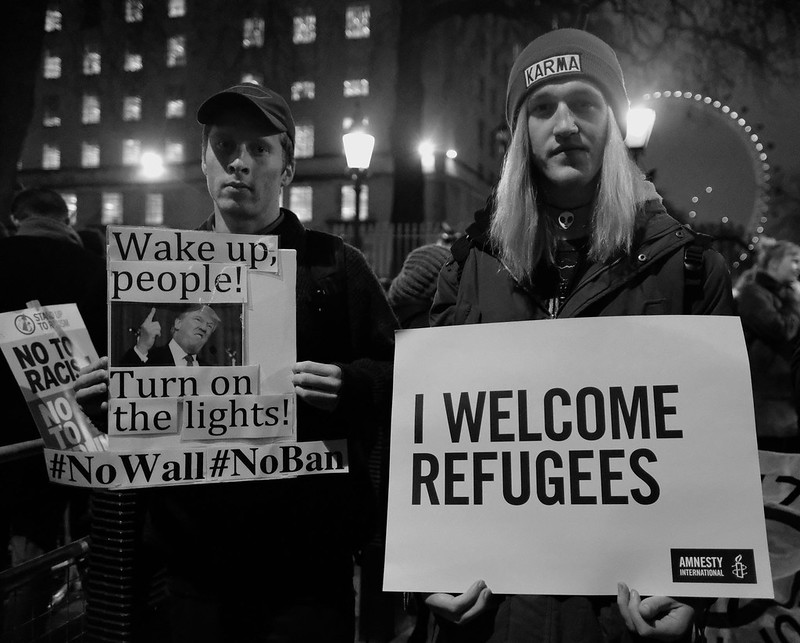Impacts of Poverty on Refugees in the UK
 The United Nations High Commissioner for Refugees (UNHCR), was established by the United Nations (U.N.) following WWII. It defines a refugee as someone who “owing to well-found fear of being persecuted for reasons of race, religion [etc.] is outside the country of their nationality and is unable…or unwilling to return to it.”
The United Nations High Commissioner for Refugees (UNHCR), was established by the United Nations (U.N.) following WWII. It defines a refugee as someone who “owing to well-found fear of being persecuted for reasons of race, religion [etc.] is outside the country of their nationality and is unable…or unwilling to return to it.”
Though this definition was only globally adopted in 1951, when applied to the history of migration to the U.K., it is apparent that there have always been refugees. Some of these include Irish refugees and European political exiles in the 19th century, Jewish refugees during WWII and refugees fleeing the conflicts in Afghanistan and Iraq in 2003. Currently, the U.K. is home to approximately 1% of the 27.1 million refugees across the world.
Why Do Refugees Come to the UK?
The U.N. states that “war and ethnic, tribal and religious violence are leading causes” for people to flee their home country. The consequences of war, including civil war, result in many falling into poverty and destitution as infrastructure and personal property are destroyed. For example, the ongoing war in Syria has resulted in extreme poverty for many. A report notes that in 2017, 27% of Syrian housing, 63% of educational facilities and 50% of medical facilities had been destroyed or damaged.
In an interview with The Borgen Project, Jon Beech, Director of Leeds Asylum Seekers’ Support Network (LASSN), points to poverty as a common reason for refugees to flee their home country. He reasons, “War and disruption often lead to people feeling economically like they haven’t got anything to lose and if you’re going to die of poverty in a dangerous place, you might as well die of poverty in a place that’s slightly less dangerous to yourself.”
There are additionally various reasons as to why refugees arrive in the U.K. The British Red Cross writes that the U.K. may seem the easiest place to rebuild life to some. As of 2023, English is the most spoken language globally, with 1.5 billion speakers. For people who have had to leave everything behind, knowledge of the native language seems like a better start to a new life for many. However, often, refugees don’t have a choice over where they are going. If they are facing persecution in their home country, they may be traveling illegally and place their lives in the hands of smugglers who dictate where they will be taken. In 2022, nearly 46,000 people arrived in the U.K. in small boats, suggesting that many had little choice.
What Difficulties Do They Face?
Many refugees in the UK struggle to obtain work. Some of the issues they face are employment gaps on CVs, lack of U.K. work experience, language barriers and cultural differences. Therefore, many refugees cannot attain regulated work, their only chance at escaping poverty. Beech notes that being granted refugee status is only step one in rebuilding a life. Beech stated, “What’s dispiriting is the level of poverty that people experience even when they get to the U.K… the predations of the unregulated labor market and financial services also further entrench people in poverty when they first get here.”
Additionally, Beech points to the current social climate, commenting, “There’s fear and uncertainty now.” Many refugees face racial discrimination and misinformation spreads rapidly online. For example, the popular notion that refugees are taking jobs from British people is misinformed, as the unemployment rate for refugees is three times greater than for the U.K.-born.
The Government’s Role in Supporting Refugees in the UK
In 2023, Human Rights Watch stated that the U.K.’s asylum and immigration system is “marred with serious systematic failures.” One significant issue is the government’s failure to provide housing after 28 days after the refugee status was granted. However, the government has supported Ukrainian refugees arriving in the U.K. as a result of Russia’s invasion.
They introduced various schemes to support refugees, such as the Ukraine Family Scheme. The scheme allows applicants to join families already living in the country. The Ukraine Sponsorship Scheme, allows applicants to move to the U.K. if they have a named sponsor in the scheme.
Approximately 174,000 people moved to the U.K. under these schemes as of May 2023. The government later introduced the Ukraine Visa and Extension Scheme, for which 24,500 applications have been granted. The government’s handling of Ukrainian refugees demonstrates that they can support refugees and make the process more accessible.
What Role Do Local People Play in Supporting Refugees?
Charities play a significant role in supporting refugees in the UK. Some, such as the British Red Cross, Refugee Action and Refugee Council, work nationwide and anyone can volunteer to help. Others are more local organizations, such as LASSN.
LASSN was formed in 1999 and initially supported refugees by teaching them English through its English at Home project. The charity runs New to Leeds, a website helping refugees get to know and understand the city. Additionally, it supports Migration Partnership and still focuses on creating a friendly and welcoming community for all refugees.
Volunteering with charities, whether nationwide or local, is how most local people can help. However, Beech points out that there are many other ways in which local people can and do help. He says, “Vote for people who agree with you on matters of migration and if the people who you want to vote for don’t have a clear view of what they’d like to do, tell them what you think because there are lots of politicians who listen to their constituents and what they say.”
– Alice Brayford
Photo: Flickr
